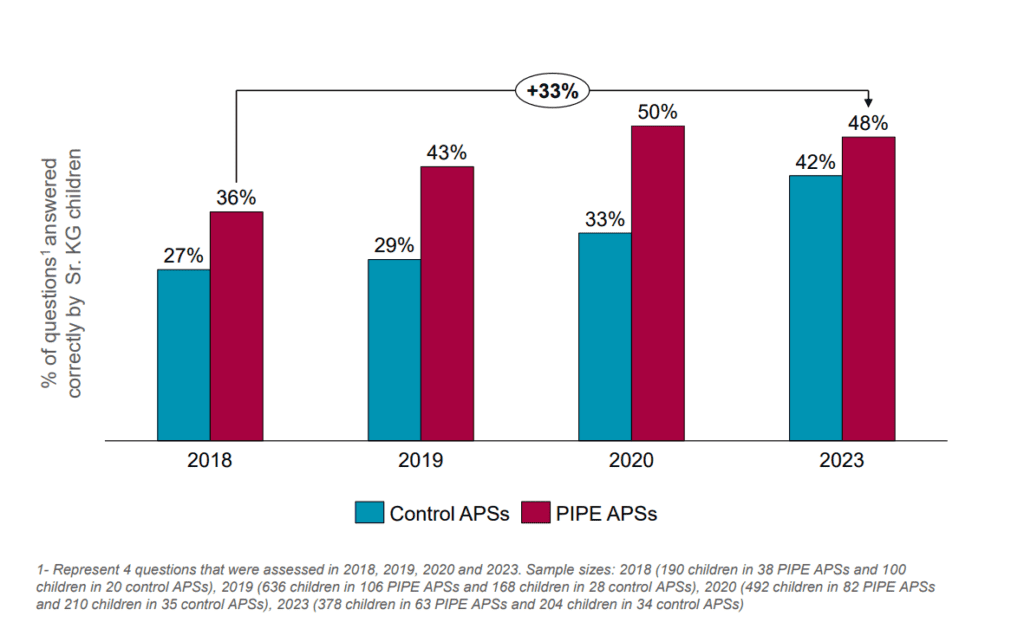Program to Improve Private Early Education (PIPE)
Impact of PIPE's Intervention in the Affordable Private School Market
Children in PIPE affordable private schools (APSs) have been performing better year on year, and have improved by 33 percent since 2018
PIPE annually conducts an independent assessment of affordable private schools using PIPE partner solutions (PIPE APSs) and affordable private schools using no external interventions (Control APSs) using the Scoring Tool for Assessing Readiness at School (STARS). The assessment covers the classroom environment, child learning outcomes, and parent, teacher, and administrator interviews.

Impact of PIPE’s Intervention on Education Quality in APSs Over the Years
- In academic year 2022-23, an assessment of 582 senior KG children across 97 PIPE and control APSs showed that Sr. KG children in PIPE APSs scored 13 percent higher than control APSs on learning outcomes. To learn more about our findings from the 2022-23 impact assessment, read our Impact Assessment Report 2022-23 >
- In academic year 2019-20, an assessment of 702 Sr. KG children across 151 PIPE and control APSs showed that children in PIPE APSs scored 48 percent higher than control APSs on learning outcomes. Specifically, children in PIPE APSs scored higher on literacy, numeracy, and cognitive tasks. To learn more, read our Impact Assessment Report 2019-20 >
- In academic year 2018-19, an assessment of 804 Sr. KG children across 134 PIPE and control APSs showed that children in PIPE APSs scored 51 percent higher than control APSs on learning outcomes. Capability of Sr. KG teachers in PIPE APSs improved due to training and coaching by PIPE partners. To learn more, read our Impact Assessment Report 2018-19 >
- In academic year 2017-18, an assessment of 290 Sr. KG children across 58 PIPE and control APSs showed that PIPE APSs scored 54 percent higher than control APSs across all sections, highlighting a marked improvement in classroom quality and stakeholder awareness of learning. Approximately 2.4x children in PIPE APSs could read new English words and 1.3x children in PIPE APSs could name more than six animals as compared to control APSs. To learn more, read our Impact Assessment Report 2017-18 >
- In academic year 2016-17, FSG conducted a baseline assessment of 480 children entering Grade 1 in APSs and government schools to measure their school readiness. Children entering Grade 1 should ideally be able to read simple 3-letter words. The assessment showed that, of the children entering Grade 1, 78 percent of children in APSs and 90 percent of children in government schools could not read simple 3-letter English words. Learn more about School Readiness of Children Entering Grade 1 >
[1] Four questions were assessed in 2018, 2019, and 2020: 1). Can you read the word ‘PIN’? 2). Can you identify the largest number from a group of numbers? 3). Can you count and give 12 sticks out of 20? 4). Can you name any 6 animals? Sample sizes: PIPE 2018 (190 children), PIPE 2019 (636 children), PIPE 2020 (492 children).
